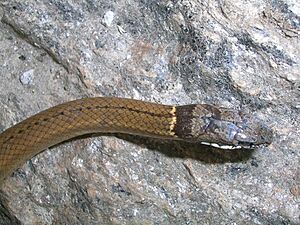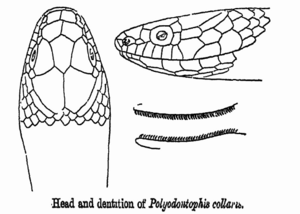Common many-toothed snake facts for kids
Quick facts for kids Sibynophis collaris |
|
|---|---|
 |
|
| Conservation status | |
| Scientific classification |
|
| Kingdom: | Animalia |
| Phylum: | Chordata |
| Class: | Reptilia |
| Order: | Squamata |
| Suborder: | Serpentes |
| Family: | Colubridae |
| Genus: | Sibynophis |
| Species: |
S. collaris
|
| Binomial name | |
| Sibynophis collaris (Gray, 1853)
|
|
| Script error: The function "autoWithCaption" does not exist. | |
| Synonyms | |
Script error: No such module "Check for conflicting parameters".
The common many-toothed snake (also known as Sibynophis collaris) is a fascinating type of snake. It has a few different names, like Betty's many-toothed snake or the collared black-headed snake. This snake belongs to the colubrid family, which is a very large group of snakes. You can find this specific snake only in certain parts of South and East Asia.
What Does the Common Many-Toothed Snake Look Like?
This snake has a unique look, especially its head. The scale at the very front of its snout, called the rostral scale, is wider than it is deep. You can just barely see it from above.
Its body is usually brown on top. The area along its spine might look a bit greyish. Often, you can spot a line of small, round black dots along its back.
The head has small black spots or patterns. It also has two black bands that go across its head. One band is near the front of its head, and the other is at the back of its head. There's also a big black spot or band on its neck. This neck band often has a yellow border behind it.
A black line runs from its nose, through its eye, and all the way to the black spot on its neck. This line borders its upper lip, which is white with black dots.
The underside of the snake is yellowish. Each belly scale has a black spot or streak on the outer edge. These spots might even join together on the back part of its body. The scales closer to its head sometimes have two small dots in the middle.
This snake can grow to be about 29 inches (737 mm) long. Its tail makes up a good portion of its length, about 9.5 inches (241 mm).
Where Does This Snake Live?
The common many-toothed snake lives in many places across Asia. It can be found in different regions of India, including Tehri Garhwal, Uttarakhand, Assam, and Simla. It also lives in Mizoram.
Beyond India, you can find this snake in several other countries. These include Bhutan, Nepal, Myanmar, Thailand, Laos, Vietnam, and Cambodia. It also lives in parts of China, specifically southeastern Tibet and Yunnan. You can also find it on the island of Taiwan.
The first time this snake was officially described was from the Khasi Hills in India.
 | Charles R. Drew |
 | Benjamin Banneker |
 | Jane C. Wright |
 | Roger Arliner Young |



